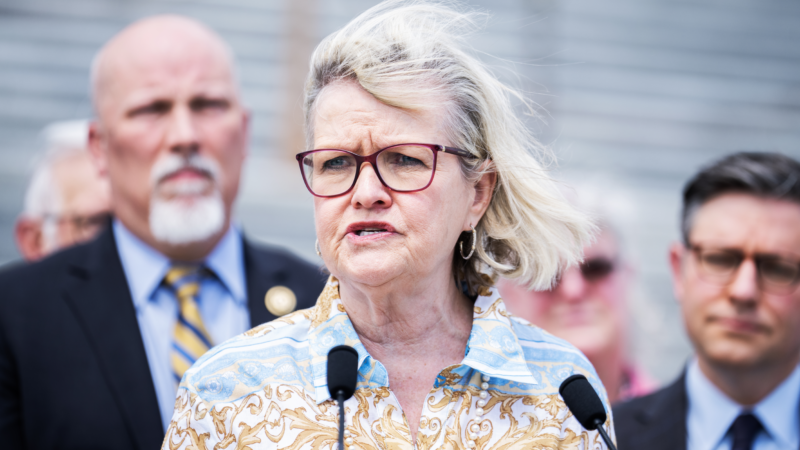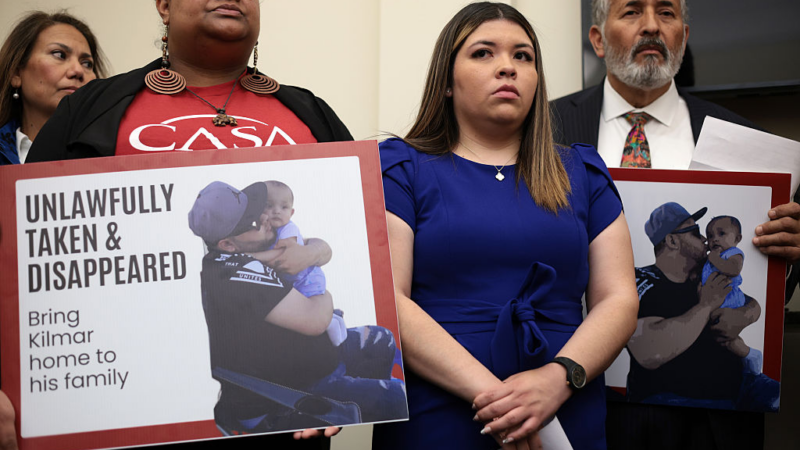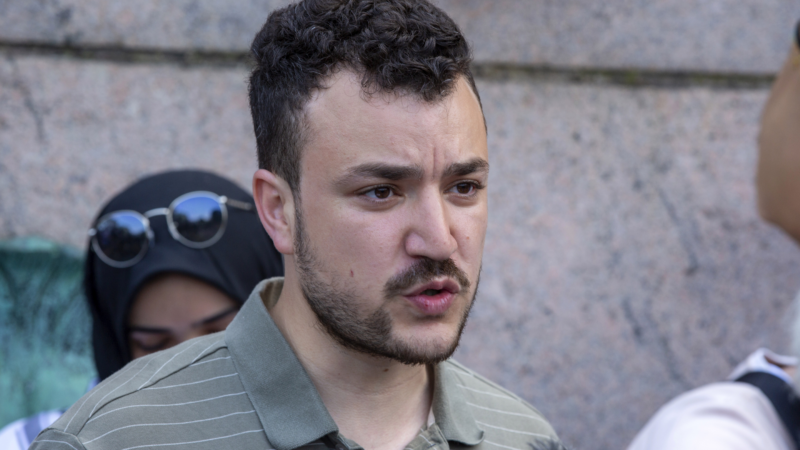Despite Trump’s win, ‘election integrity’ activists still seek sweeping voting changes
For Donald Trump and his supporters, concerns about election administration quickly dissipated once it became clear he would win the 2024 presidential election, and in surveys since, most Republican voters say the election was run well.
But for the wing of the Republican Party that has been pushing sweeping election reform since the 2020 contest, the work continues.
On Jan. 3, the day the new Republican-led Congress was sworn in, Rep. Chip Roy, R-Texas, reintroduced legislation aimed at stopping noncitizens from voting in federal elections — something that is already illegal and which research has universally shown rarely happens.
The bill, dubbed the SAVE Act, would add new proof-of-citizenship requirements to voter registration that experts say could disenfranchise scores of eligible voters.
It was one of the first bills introduced in the 119th Congress, a sign that what supporters call election integrity policy remains a key part of the GOP agenda, even after Trump’s win.
“American elections belong to American citizens, and the public’s confidence in those elections is the cornerstone of our republic,” Roy said in a statement about the bill.
While Trump’s win in a high-turnout election has led some experts to wonder if conservatives would embrace broader voter access, the legislation and other proposals make it clear that activists will continue to push to make voting more restrictive.
A key architect of those restrictive policies is Cleta Mitchell, a conservative elections attorney who has built a national grassroots election integrity network largely made up of Trump supporters motivated by his 2020 election lies and more recently narratives pushed by him and others last year about widespread noncitizen voting.
NPR acquired audio of an elections panel Mitchell led in December for state lawmakers at a meeting of ALEC, the American Legislative Exchange Council, which is a conservative organization that helps draft state-level legislation. The recording was provided to NPR by the nonprofit investigative watchdog group Documented.
“We’re going to begin a real effort [in 2025] to educate state legislatures and legislators, as well as members of Congress, to identify the problems,” Mitchell said during the panel’s introduction. “We’re going to be talking … about the things that need to be done to restore voter confidence.”
Throughout the hour-long panel, no one on stage noted that people by and large trusted the election results this cycle.
“Fear is a very effective tool to generate support for policy change,” said Ron Hayduk, an expert on noncitizen voting at San Francisco State University. “So despite all the evidence of the contrary, [Republicans have] many reasons to keep these narratives alive.”
In an email to NPR, Mitchell said election integrity “is about the election process — not just one election.”
“We want election systems in which the great majority of voters trust the results every election, even if they don’t like the outcome, because they are persuaded that the process is lawful and that it is transparent so the voters can be confident that the results are accurate,” she said.
She added that the reason 2024 was trustworthy was because people, like those associated with her group, were watching election officials closer this time around.
Cleta Mitchell’s policy priorities
Noncitizen voting will continue to be the central focus of election integrity efforts in 2025.
Mitchell has been circulating a policy document laying out her goals, which include major access changes like eliminating all early voting and same-day voter registration, but the first bullet point is making sure “only US citizens participate in US Elections.”
There has never been evidence of widespread noncitizen voting, but Hayduk says the false narrative has been around more than 100 years and it combines multiple helpful ideas for the right.
“It keeps immigrants in the news as public enemy No. 1,” Hayduk said. “But most importantly, it is a basis to enact legislation that for the foreseeable future hampers the capacity to vote of a whole set of constituents that tend to line up with Democrats.”
Most Americans, on both sides of the aisle, feel only U.S. citizens should vote in American elections. But surveys have shown that legislation requiring proof-of-citizenship documents like a birth certificate or passport to register to vote would probably have a disproportionate impact on eligible citizens of color as well as registered Democrats and independents, versus Republicans.
A focus on officials who oversee voting
In another part of the ALEC panel, Mitchell said she wants to push back against election officials who go out of their way to make voting more accessible or who actively work to register new voters.
“Here is something I think that we need to make clear to election administrators: Your job is to administer the elections according to the law and to treat every voter and group of voters the same,” Mitchell said. “Your job is not voter turnout.”
Every moment an official is spending on turnout, she added, is a moment not being spent cleaning voter rolls and making sure only eligible people are voting.
Sharon Bemis, the managing director of Mitchell’s Election Integrity Network, also urged the lawmakers in attendance to fight any legislation in their states that adds new protections for election workers. Numerous states passed such protections in the wake of 2020 and the surge of threats that followed Trump’s lies.
The panelists all seemed to agree, however, that the threat environment for election officials was overblown by the media.
“I think you’ll find in your states that it’s unfounded if you ask for police reports,” Bemis said. “I think you’ll find that it’s very rare.”
It is true that not all election officials have faced threats — law enforcement has said they’re concentrated in swing states — but officials across the political spectrum agree election workers face more harassment and pressure now than before 2020.

Still, Bemis told lawmakers to help with “shutting down the threat narrative” by “not passing bills that specifically call out election administrators for being attacked.” Bemis and Mitchell say election officials don’t need more protections from harassment or threats than other people.
Panelists also discussed working to expand the role of local election boards in the certification process and tightening voting access for overseas Americans, both controversial topics that came up a lot as the 2024 election neared.
Watch for action at the state level
The federal SAVE Act could have a hard time getting past the Senate’s 60-vote threshold, but restrictive policy initiatives may have more success in Republican-led states.
“Obviously we hope that there will be some federal election reform … but we can’t count on that,” Heather Honey, a Pennsylvania election activist who works with Mitchell, told state lawmakers during the ALEC panel. “So states have to take this opportunity to modernize the laws.”
Proof-of-citizenship requirements specifically could, however, take states into murky legal territory.
Kansas’ effort to institute a proof-of-citizenship law a decade ago was ruled unconstitutional after a lengthy and politically damaging legal battle, and Arizona is now forced to maintain separate registration lists for federal and state elections due to a court ruling about its law. New Hampshire also passed a citizenship documentation requirement last year that is facing legal challenge.
Election officials usually say noncitizen voting has never been shown to be a real issue, so there’s no need for further tightening on top of the current system, which requires would-be voters to attest to their citizenship. If a noncitizen illegally registers and votes, they risk arrest and they potentially eliminate the chance they will ever become a U.S. citizen.
More broadly, it remains to be seen just how busy 2025 will be when it comes to election legislation.
The last year following a presidential year, 2021, was historically packed, as states rushed to either codify or roll back COVID-era voting changes. And off-federal election years are generally the best time to pass new voting changes because officials have more time to implement them, says Roy Blunt, a former secretary of state and Republican U.S. senator from Missouri.
This year could potentially be an especially productive time for legislators, he said, as tensions about voting seem to be easing a bit.
“It’s given us a little reprieve here of being skeptical about every election, every time,” said Blunt, who is now an executive fellow at the Bipartisan Policy Center. “It’s a good time to say, ‘what in our state law prevents us from doing things as well as we’d like to do them?'”
An open question is how much sway advocates like Mitchell, who want wholesale reforms versus incremental tweaks, will have in those negotiations.
Transcript:
JUANA SUMMERS, HOST:
The 2024 election was widely considered a success in that majorities of both major political parties say they thought it was administered well and run fairly. But so-called election integrity advocates are not taking a victory lap. NPR acquired audio that shows how the people who think 2020 was stolen are already making plans for 2025. NPR voting correspondent Miles Parks has that audio, and he’s here in the studio. Hey there.
MILES PARKS, BYLINE: Hey, Juana.
SUMMERS: So Miles, tell me about this audio.
PARKS: So it’s a recording at a meeting of ALEC, which is the American Legislative Exchange Council. This is a conservative organization that helps draft policy for state lawmakers. We got this audio, which was secretly recorded, from the watchdog group Documented. And the audio is of a panel which was put together by conservative election attorney Cleta Mitchell, who was a key figure in Donald Trump’s efforts to overturn the 2020 election. Listeners might remember she was on that call after the 2020 election where Trump tried to pressure Georgia election officials to find votes. She’s not an ALEC employee, but her Election Integrity Network has become really influential in crafting policy for the sort of election denial wing of the Republican Party.
SUMMERS: Got it. Miles, what was her main message?
PARKS: So the message was that, despite a successful election for Donald Trump and for other Republicans, elections still need major changes. One interesting point that Mitchell made was that she wants to target election officials who are going out of their way to make voting easier or to register new voters.
(SOUNDBITE OF ARCHIVED RECORDING)
CLETA MITCHELL: Your job is to administer the election according to the law and to treat every voter and group of voters the same. Your job is not voter turnout.
PARKS: You know, Republicans succeeded this election cycle on a very high turnout environment. Trump won low-propensity voters. But Mitchell’s comments suggest that this wing of the party is still wary of policies that might bring new people into the electorate.
SUMMERS: OK. So what kind of changes are Mitchell and her group pushing in terms of policy?
PARKS: So ahead of this meeting, she did release a document that laid out a lot of her policy priorities. Some of the things in there are things that even election – many election experts would get behind – things like election offices sharing data with their state DMVs to keep addresses up to date, for instance. But she also wants the U.S. to move back to single-day, in-person voting. And more importantly, she wants to add new restrictions, new requirements for people in terms of the documents they need to be able to register to vote.
I mean, broadly, the tone of this panel was this idea that election administration is still in chaos. And Mitchell and I emailed about this this week, and she said the reason that this year’s election went well was because people like her and her advocacy group were kind of watching like hawks over election officials.
SUMMERS: Right. But, Miles, I know this because you’ve reported it for us. That intense scrutiny has led to threats and harassment for some local election officials and clerks. Did that come up at this meeting?
PARKS: It did, and they basically said it’s not actually happening. You know, similar to the riot at the Capitol on January 6, it’s going to be really interesting over the next couple years as we see Trump and then some of these advocacy groups try to paper over what has been happening when it comes to the local election officials because, as you mentioned, we know from reporting and survey data that many of their lives have been upended by this campaign. You can listen here to Sharon Bemis, who’s a former town clerk who now works for Cleta Mitchell’s group, talking about what she calls the election official threat narrative.
(SOUNDBITE OF ARCHIVED RECORDING)
SHARON BEMIS: So many of us are familiar with the threat narrative that has been very prominent. I think you’ll find in your state that it’s unfounded. If you ask for police reports related to threats against your election administrators, I think you’ll find that it is very rare.
PARKS: Now, Bemis’ organization did not respond to requests for comment from NPR, but during this panel, she specifically told the lawmakers in attendance, do not pass bills that give election officials more protections from harassment or from threats than other people.
SUMMERS: NPR’s Miles Parks. Thank you.
PARKS: Thank you.
(SOUNDBITE OF CURREN$Y AND STATIK SELEKTAH SONG, “GRAN TURISMO”)
Why some are accusing Trump of manipulating stock markets
Senators Adam Schiff and Ruben Gallego have asked for "an urgent inquiry" into whether President Trump or others engaged in insider trading on advanced knowledge of his tariff policy changes.
Supreme Court says Trump officials should help return wrongly deported Maryland man
The Supreme Court ordered the administration to "facilitate" the return of Kilmar Armando Abrego Garcia, who was mistakenly taken to El Salvador and remains in custody there.
15 hours later, a grueling ER shifts ends in ‘The Pitt’ season finale
The first season of The Pitt focused on the toll that work takes on doctors and nurses. It's also been a stellar season of TV.
HHS will review guidance on the addition of fluoride to drinking water
HHS Secretary Robert F. Kennedy Jr. has blamed the addition of fluoride — a common, naturally occurring mineral — for a host of health issues. The CDC says the policy has reduced cavities by some 25%.
Trump administration lays out its evidence for deporting activist Mahmoud Khalil
Khalil's attorneys say the government's case against their client largely rests on a single letter from Secretary of State Marco Rubio alleging that Khalil participated in "antisemitic" and "disruptive activities."
The Northeast bet big on offshore wind. Trump wants to halt the industry entirely
Northeast states have bet big on offshore wind to meet spiking power demand and drive economic growth. But the industry's future is much more uncertain under President Trump.









